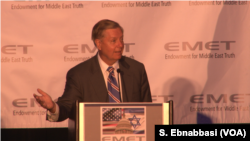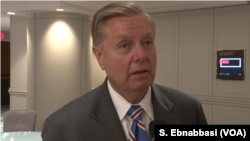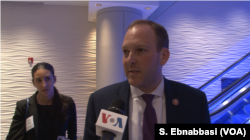This article originated in VOA’s Persian Service.
A decades-old debate about whether the United States should seek a mutual defense treaty with its ally Israel has resurfaced with a call by Republican Sen. Lindsey Graham for lawmakers to approve a pact next year.
Speaking at an event in Washington late Wednesday, Graham told an audience that he wants to see the Senate vote on a U.S.-Israel defense treaty sometime next year to show Iran and the rest of the world that “an existential threat against Israel is an existential threat against the United States.”
Graham, a prominent Senate supporter of President Donald Trump, spoke as the guest of honor at an annual dinner of the Endowment for Middle East Truth (EMET), a pro-Israel group that advocates U.S. support for Israel.
The South Carolina senator initially proposed seeking a U.S.-Israel mutual defense treaty in remarks to an April 6 Republican Jewish Coalition meeting in Las Vegas, and he used his EMET speech to expand on that idea.
Warning to Iran
Graham said the U.S. has a “long list” of mutual defense commitments to its NATO allies and Taiwan, and his goal is to add Israel to it. He said he wants to send a “clear signal” to Iran that if it follows through on threats to destroy Israel, its longtime regional foe, it will do so at its “own peril.”
“I want the ayatollah to know that (for) any missile coming from Lebanon (or) any attack coming from Gaza inspired by the Iranians, we are going to hold you accountable,” Graham said, in reference to Iranian Supreme Leader Ayatollah Ali Khamenei, who funds anti-Israel proxy forces in both Lebanon and Gaza.
In further remarks to VOA Persian after his speech, Graham said it has been his long-standing goal to solidify the U.S. relationship with Israel, whom he said shares intelligence and military technology that keeps the U.S. safe.
“This (proposed security agreement) will make the world safer. Every moderate Muslim should embrace this, because if your goal is to destroy Israel, then we will fight you. If your goal is to work with Israel for peace, we will support you.”
Earlier, Graham told attendees of the EMET event that he will travel to Israel next month to meet Israeli officials and discuss “what a security agreement would look like.” The Israeli Embassy in Washington declined to comment on his proposal when contacted by VOA Persian on Thursday.
Defense pact debated
U.S. and Israeli officials and analysts have debated the pros and cons of a U.S.-Israel mutual defense treaty for decades. Some critics have argued that such a treaty is unnecessary because Israel long has been a major recipient of U.S. military aid, which currently amounts to $3.8 billion a year.
Israel also has long expressed a desire to defend itself independently against external threats.
“Israel must always be able to defend itself, by itself, against any threat,” Prime Minister Benjamin Netanyahu said at a Feb. 14 meeting with Vice President Mike Pence in Warsaw, repeating a line that the Israeli leader has used multiple times.
Some analysts also have said that Israel long has understood that much of its support in the United States stems from a public perception that the Jewish state has been able to take care of itself. They have said Israel has been concerned that its U.S. public reputation for independence could erode if a mutual defense treaty is signed.
In his EMET speech, Graham expressed sensitivity to Israel’s position.
“I will try to find a way to cobble this (security agreement) together and express it in a way that reinforces Israel’s security and never undermines the idea of its ability to independently defend (itself),” he said.
No members of the U.S. House of Representatives appear to have expressed a position on seeking a defense pact with Israel since Graham’s first reference to the issue in April.
Republican Congressman Lee Zeldin, another honoree at the EMET event, told VOA Persian that he wants to learn more about Graham’s idea.
“I’m going to speak to him about it,” Zeldin said. “I haven’t had a conversation with Sen. Graham about what he has in mind, but I would look forward to having that conversation with him for sure.”









